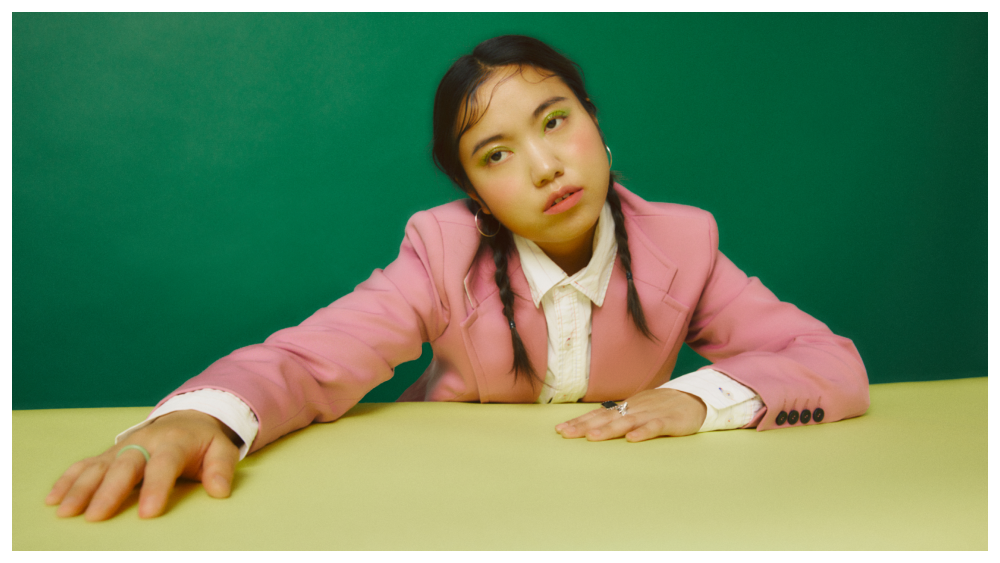Identity slips and slides, its many layers shedding and coalescing under our skin throughout our lives. Under the moniker mui zyu, musician Eva Liu unpeels her past through striking food imagery, letting it fall around her – a peach’s unravelled skin, a bun’s flaky layers, an egg’s cracked shell – throughout her debut album. In the messy debris, Eva, as mui zyu, reconstructs herself as a video game-esque protagonist-character, her voice guiding the listener through a fantastical soundscape inspired by Chinese folklore.
'I wasn’t intentionally wanting to make an album about self exploration and identity,' says Eva with a laugh over the phone. 'It all sort of came together as a way of processing the last few years.'
Eva has always wanted to create music, although as a child, she was discouraged from pursuing art as a career. 'Music theory was the bane of my life and I didn’t get the grades to study music. I just didn’t think it was something I could pursue seriously, especially because I grew up with parents who thought a career in music could only mean classical music or playing in an orchestra. I love my mum and I know she was protecting me, but she warned me that there was no one who looked like me making the art I wanted to make in the western world.'
It wasn’t until Liu went to university in London and met guitarist Luciano Rossi and drummer Daniel Grant – her future Dama Scout bandmates – that she began creating the sort of music she had always loved. 'We bonded over bands like Broadcast and Stereolab. We have diverse tastes in music and we merged them together to write music together.'
As part of the art-pop-punk trio, Eva became more confident in finding her own musical voice. 'Being in the band influenced me to just have fun and not to think too much; to make mad sounds and to just go for it.' she says.
After a few years as Dama Scout’s frontperson, Eva began working on her own music; what would become her solo project mui zyu’s first album, Rotten Bun for an Eggless Century. Most of the album was written during the Covid-19 lockdowns, a period of intense isolation and turbulence.
'A lot of this album is to do with this positive change and it reflects this sense of community, the power it can have and that we’re not alone.'
'Like most of us I was at home and itching to make more music,' she explains. 'I was writing this album when there was a lot of hate crime happening towards East and Southeast Asian (ESEA) people. And at the same time, my parents had just moved to Hong Kong and I was getting my head around the protests that were happening as well as feeling that distance with my family. The songs emerged as a way of processing all that.'
While working on the album, Eva began connecting with ESEA communities and collectives, and she emphasises the support this sense of solidarity offered during a lonely time. 'For most of us it was the first time we had a sense of community,' she says. 'It really helped me process a lot of things that I had been looking at inside me. A lot of this album is to do with this positive change and it reflects this sense of community, the power it can have and that we’re not alone.'
Although Eva has previously explored aspects of her heritage through Dama Scout’s music, on Rotten Bun for an Eggless Century, she’s not only embracing her Hong Kong British identity through her music – she’s also creating a world from it and for it.
'When I put these songs together I definitely reflected on the sounds I experienced growing up in an Asian household. It wasn’t until I was writing this album that I really thought about the sounds that I found so comforting as a child.'
'Mui Zyu is my Cantonese nickname,' she explains. 'My grandmother started calling me that name when I was a baby and it technically translates to little sister pig. It’s always stuck, so I’m always Mui Zyu amongst my family. I felt like this project suited that name and it really represented what I’m going through.'
Familial connections and memory is the heart of Rotten Bun for an Eggless Century. 'When I put these songs together I definitely reflected on the sounds I experienced growing up in an Asian household,' Eva says. 'It wasn’t until I was writing this album that I really thought about the sounds that I found so comforting as a child. I grew up above my dad’s restaurant. I would go to sleep hearing the banging of woks and my dad shouting in Cantonese. Even now, I can’t sleep unless there’s some sort of noise.'
Food is an important cipher for identity on Rotten Bun for an Eggless Century, inspired by Eva’s childhood above her father’s restaurant. During the pandemic, recipes became an important way for Liu and her father to connect despite their physical separation. 'Now he’s retired, he’s so excited to tell me how to make things. I’ve been getting more into cooking and while I was writing the album during the pandemic, I was getting more into making food that my dad makes.'
On the album’s interlude Ho Bao Daan, Eva’s father makes an appearance to describe how to make the Hong Kong fried egg speciality. 'The English translation of the dish is pocket egg or purse egg,' says Liu. 'It’s always the way my dad has cooked a fried egg and I loved the idea of a little bag being like a little inventory bag in a video game.'
Other food imagery, featured on the songs Ghost with a Peach Skin and Rotten Bun, is equally culturally significant. 'The peach represents longevity in Chinese art,' she explains. But, as she points out, it’s a fragile fruit, one that bruises if not handled with care. While Ghost with a Peach Skin is a playful pop song, made in collaboration with traditional guzheng player, Yijia Tu, a repetitive sonic 'bruising' refrain lurks in the background. There is always the potential for pain amidst joy. Food in mui zyu’s world is a childhood comfort, but it’s one that is precarious and easily threatened by decay, loss and violence.
'I’m definitely not closing the door completely but I’m excited to explore my next lot of music in a different way,' she says. 'I’m writing new music at the moment and piecing together what that could be. I think it’ll be an evolution of Rotten Bun for an Eggless Century. I don’t think mui zyu is confined to just this album’s world and I’m excited to see where that takes me in the future!'





